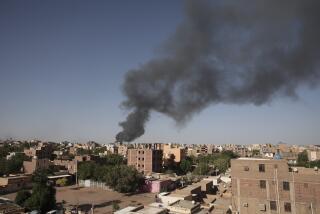Srebrenica Airlift Ends as West Studies Bosnia Options
- Share via
TUZLA, Bosnia-Herzegovina — Serbian guns trained on Srebrenica kept silent as U.N. troops worked to cement a truce for the mostly Muslim town in eastern Bosnia.
A two-day airlift ended Monday after French and British helicopters brought hundreds of sick and wounded to Tuzla, a Muslim city 45 miles to the northwest. Patients had suffered for months without adequate medicine and care.
Some have infections after makeshift operations, some of which were performed without anesthetic. Others winced in pain with every movement as they were taken out of the helicopters on stretchers and rushed to hospitals for emergency treatment.
Helicopters evacuated 354 seriously wounded people Monday; 133 were flown out Sunday.
But in a new setback for relief operations, local Muslim authorities refused to let a U.N. aid convoy take out by road any of the other 30,000 refugees trapped in Srebrenica. Peacekeepers arrived Sunday after defenders signed a truce that amounted to a virtual surrender of the town--one of only three remaining Muslim enclaves in eastern Bosnia-Herzegovina.
In Washington, President Clinton sought allied support for joint action in Bosnia, including possible use of military force to make defiant Bosnian Serbs accept an international peace plan, U.S. officials said.
Clinton’s national security aides, after a series of top-secret sessions, have sent him a series of military options, “all of them bad,” said Defense Secretary Les Aspin.
Aspin declined to specify the options, saying the situation is too sensitive, but said that “the situation is so bad (that) talking about it can give you a splitting headache.”
Although one option would be to do nothing, Aspin said, “nobody argued for that.”
An Aspin aide later said the secretary was especially frustrated because the Clinton Administration has been unsuccessful in persuading European allies to take a more active role in resolving the crisis.
Clinton was to discuss options with French President Francois Mitterrand by telephone today after being unable to talk with him Monday, Press Secretary Dee Dee Myers said. He talked Sunday with British Prime Minister John Major.
In London, British Foreign Secretary Douglas Hurd said: “We cannot refuse to look at all ideas, including those which have been considered before and not adopted. We are looking to turn sanctions into a blockade.”
France and Britain have thousands of troops in Bosnia to protect international relief efforts, and they have been reluctant to endorse actions that would put their forces at risk.
German Chancellor Helmut Kohl said that international military intervention “cannot bring about a solution” to the conflict in the former Yugoslav federation and that Serbia and Montenegro should be suspended from all international organizations.
“We would have to fear a heavy toll of lives on the side of civilians there as well as among the international armed forces,” Kohl said in a statement issued in Bonn.
Blaming Serbia for the fighting, Kohl called for tight economic sanctions and “total political isolation” to bring about peace.
Kohl reiterated his government’s opposition to deploying any German ground troops to the embattled republics, “not only for historical reasons” but also because the Serbs could use such a deployment to their advantage in their “war propaganda” against the West.
Russia called for a final effort to secure peace in Bosnia, saying failure could lead to all-out war in the Balkans. It also proposed a top-level U.N. Security Council meeting in the war zone to solve the crisis.
Bosnia called on the Security Council Monday to support a resolution authorizing U.N. members to provide all necessary assistance--including force--to help repel Serb attacks.
Despite stiff international sanctions already in place, the Bosnian Serbs have refused to accept the peace plan that would turn the former Yugoslav republic into virtually autonomous provinces along ethnic lines.
If they do not agree to the plan by April 26, new sanctions approved by the Security Council will take effect.
More to Read
Sign up for Essential California
The most important California stories and recommendations in your inbox every morning.
You may occasionally receive promotional content from the Los Angeles Times.













